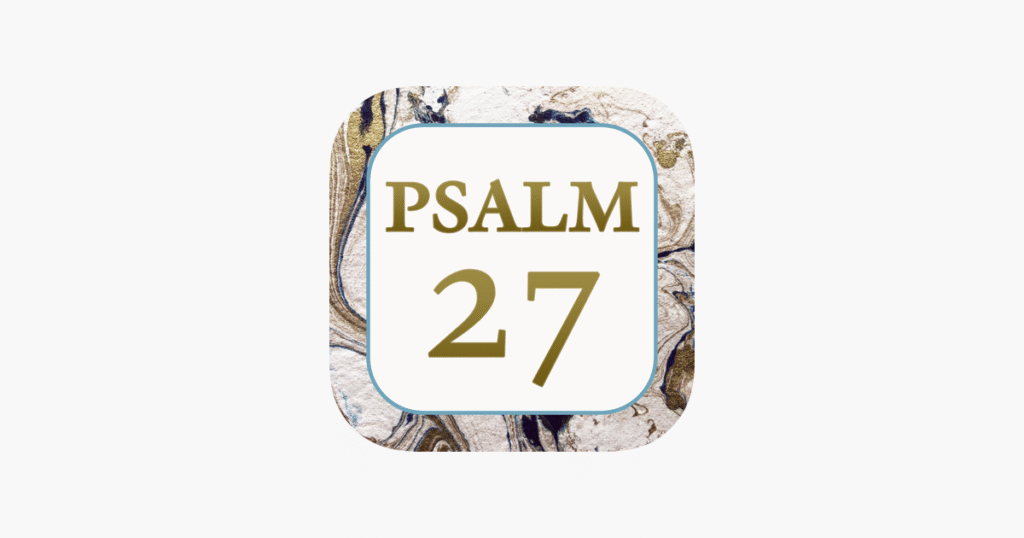Psalm 27 stands as one of the most beloved and powerful passages in the entire Book of Psalms. Written by David, this remarkable psalm captures the essence of authentic faith – a faith that boldly declares confidence in God while simultaneously expressing honest vulnerability and desperate need.
What is Psalm 27 about? At its core, this psalm reveals how genuine believers can experience both unwavering trust and deep struggle within the same breath. It’s a masterpiece that speaks to anyone who has ever wondered how to maintain confidence in God when circumstances seem overwhelming.
The Paradox of Fear and Faith in Psalm 27
The opening verse of Psalm 27:1 immediately presents us with a powerful declaration: “The Lord is my Light and my Salvation; whom shall I fear? The Lord is the stronghold of my life – of whom shall I be afraid?”
Yet by verse 9, we hear the same voice crying out in desperation: “Do not hide your face from me, do not turn your servant away in anger; you have been my help.”
This apparent contradiction reveals a profound truth about authentic faith. David doesn’t present us with a sanitized version of spirituality where doubt and struggle are absent. Instead, he models how mature believers can hold both confidence and vulnerability in tension.
The benefits of Psalm 27 include:
- Learning to express honest emotions to God
- Developing unshakeable trust despite circumstances
- Understanding how to prioritize God’s presence above all else
- Finding courage to face overwhelming opposition
Historical Context and Authorship of Psalm 27
Who wrote Psalm 27? The psalm is attributed to David, and internal evidence strongly supports this authorship. The military imagery, references to enemies and adversaries, and the deeply personal tone all align with David’s experiences as both shepherd and king.
Possible Historical Settings
Biblical scholars suggest several possible contexts for when David composed this psalm:
| Historical Period | Circumstances | Supporting Evidence |
|---|---|---|
| Saul’s Persecution | Fleeing from King Saul | References to enemies and evildoers |
| Absalom’s Rebellion | Son’s attempt to overthrow him | Military language about armies |
| Later Royal Challenges | Various threats to his reign | Mature theological reflection |
The psalm’s two-part structure suggests it may have been written during a prolonged period of crisis, where David experienced both moments of divine confidence and seasons of desperate prayer.
Literary Structure: Understanding Psalm 27’s Unique Design
What does Psalm 27 mean becomes clearer when we understand its carefully crafted structure. The psalm divides into two distinct sections:
Part One: Declarations of Confidence (Verses 1-6)
- Bold affirmations about God’s character
- Military imagery of divine protection
- Focus on worship and God’s beauty
Part Two: Urgent Petitions (Verses 7-14)
- Desperate pleas for God’s attention
- Honest expressions of need and vulnerability
- Concluding exhortation to wait on the Lord
This structure mirrors the human experience of faith, where seasons of strength alternate with periods of struggle, yet both are essential components of a genuine relationship with God.
Verse-by-Verse Analysis: Declarations of Confidence (Psalm 27:1-6)
The Divine Metaphors of Protection (Psalm 27:1)
Psalm 27:1 introduces three powerful metaphors that define God’s relationship with believers:
“The Lord is my Light”
- In Hebrew culture, light represented knowledge, guidance, and life itself
- Light dispels darkness, confusion, and fear
- God as light means He illuminates our path and reveals truth
“The Lord is my Salvation”
- Salvation (Hebrew: yeshuah) encompasses deliverance, safety, and wholeness
- This isn’t just eternal salvation but daily rescue from trouble
- God actively intervenes on behalf of His people
“The Lord is the Stronghold of my Life”
- Stronghold refers to a fortified refuge or fortress
- Ancient cities had strongholds where citizens fled during attacks
- God Himself becomes our place of ultimate security
Military Imagery and Complete Trust (Psalm 27:2-3)
David employs vivid military language to describe opposition:
- “Evildoers” – those who actively pursue harm
- “Adversaries” – opponents in conflict
- “Foes” – personal enemies seeking destruction
The progression from individual threats to cosmic warfare (“though an army besiege me”) reveals David’s absolute confidence. He uses hyperbolic language to emphasize that no opposition, regardless of size or strength, can shake his trust in God.
The One Essential Request (Psalm 27:4)
Psalm 27:4 contains one of the most beautiful expressions of spiritual priority in Scripture:
“One thing I ask from the Lord, this only do I seek: that I may dwell in the house of the Lord all the days of my life, to gaze on the beauty of the Lord and to seek him in his temple.”
Key Elements of This Request:
| Phrase | Hebrew Meaning | Significance |
|---|---|---|
| “One thing” | ‘achath | Singular focus amid multiple needs |
| “Dwell” | yashab | Permanent residence, not visiting |
| “Beauty” | no’am | Pleasantness, delight, favor |
| “Seek” | baqar | Diligent inquiry, careful examination |
David prioritizes relationship with God above safety, success, or even survival. This reveals the heart of true worship – seeking God for who He is, not merely for what He provides.
Divine Hospitality and Protection (Psalm 27:5-6)
The imagery shifts to divine hospitality. In ancient Near Eastern culture, offering shelter to a guest created a sacred obligation to protect them. David envisions God as the ultimate host:
- “Shelter” – temporary protection during crisis
- “Tent” – personal, intimate dwelling
- “Rock” – permanent, unshakeable foundation
The progression from shelter to rock shows movement from temporary relief to permanent security. David’s response involves sacrifices of joy – worship that emerges from experiencing God’s deliverance.
Urgent Petitions: The Turn to Supplication (Psalm 27:7-14)
The Dramatic Shift (Psalm 27:7-9)
The transition from confidence to petition appears sudden, but it reflects the reality of faith under pressure. David’s pleas include:
“Hear my voice when I call”
- Desperate need for divine attention
- Fear that God might not be listening
- The importance of vocal prayer and expression
“Do not hide your face from me”
- In Hebrew thought, God’s face represented His favor and attention
- Divine hiddenness was considered the greatest terror
- The relationship between sin and divine withdrawal
“Do not reject your servant in anger”
- Appeals to the covenant relationship
- Acknowledges potential reasons for divine distance
- Seeks mercy despite unworthiness
Human Abandonment and Divine Faithfulness (Psalm 27:10)
Psalm 27:10 presents one of the most poignant verses in Scripture:
“Though my father and mother forsake me, the Lord will receive me.”
In ancient culture, family abandonment represented the ultimate rejection. Parents had legal and moral obligations to their children that superseded almost all other commitments. David declares that even if the most fundamental human relationships fail, God’s faithfulness remains constant.
Modern Applications:
- Comfort for those experiencing family rejection
- Hope for orphans and abandoned children
- Assurance that God’s love transcends human limitations
- Foundation for understanding divine adoption
Prayer for Guidance and Protection (Psalm 27:11-12)
David’s petitions become more specific:
“Teach me your way, Lord”
- Request for moral and practical guidance
- Recognition that divine instruction is needed
- Desire to align with God’s will and character
“Lead me in a straight path”
- Hebrew ‘orach refers to a well-traveled road
- Implies ethical living that avoids moral pitfalls
- Protection through obedience and wisdom
“Because of my oppressors”
- Enemies continue to pose real threats
- False witnesses bring legal accusations
- Violence threatens physical harm
The connection between divine guidance and protection from enemies shows that obedience and safety are often linked in God’s economy.
Faith Declaration and Final Exhortation (Psalm 27:13-14)
The psalm concludes with renewed confidence and practical instruction:
Psalm 27:13: “I remain confident of this: I will see the goodness of the Lord in the land of the living.”
- “Goodness” (tub) – God’s beneficial acts and character
- “Land of the living” – this present life, not just eternity
- Expectation of experiencing God’s favor now, not just later
Psalm 27:14: “Wait for the Lord; be strong and take heart and wait for the Lord.”
The double emphasis on waiting reveals its critical importance. The Hebrew word qavah means active expectation, not passive resignation. This waiting includes:
- Courage to persist despite difficulties
- Strength that comes from divine resources
- Heart engagement, not mere intellectual assent
Theological Themes and Modern Applications
The Theology of Divine Presence
Psalm 27 develops a rich theology of God’s presence through multiple metaphors:
God as Light, Salvation, and Stronghold
- These aren’t merely poetic expressions but theological statements
- God’s character encompasses illumination, deliverance, and security
- Believers can depend on these aspects of divine nature
Temple Theology and God’s Dwelling Place
- The house of the Lord represents God’s accessible presence
- While the physical temple was central to Old Testament worship, the principle applies to all places where God meets His people
- Modern believers experience this through personal prayer, corporate worship, and Scripture reading
Faith and Fear Coexisting
Psalm 27 demolishes the myth that mature faith eliminates all fear and doubt. Instead, it shows:
Emotional Honesty in Prayer
- David models transparent communication with God
- Authentic spirituality acknowledges real struggles
- God welcomes honest expressions of need and confusion
The Danger of Superficial Faith
- Denying reality doesn’t demonstrate trust
- Pretending struggles don’t exist weakens genuine faith
- Biblical faith includes both declaration and dependence
Worship as Response and Resource
David’s emphasis on the beauty of the Lord reveals worship’s dual function:
Worship Emerges from Deliverance
- Sacrifices of joy follow experiences of God’s protection
- Gratitude naturally flows from recipients of divine mercy
- Corporate and private worship celebrate God’s faithfulness
Worship Shapes Perspective
- Focusing on God’s beauty transforms how we view circumstances
- Regular engagement with divine character builds confidence
- Aesthetic dimensions of faith feed the soul’s deepest needs
Practical Applications for Contemporary Believers
Developing Unshakeable Confidence
Building Faith Through Scripture Meditation
- Regular study of God’s character and promises
- Memorizing key verses like Psalm 27:1
- Applying biblical truth to specific fears and anxieties
Using Divine Metaphors
- When facing confusion, remember God as Light
- During crises, claim God as Salvation
- In times of vulnerability, find refuge in God as Stronghold
Community Support
- Sharing struggles with trusted believers
- Receiving prayer and encouragement from others
- Contributing to others’ faith journey through testimony
Honest Prayer and Emotional Authenticity
Permission for Real Struggles
- God welcomes our honest emotions and questions
- Authentic prayer includes complaints, fears, and doubts
- The biblical model encourages transparent communication
Moving Beyond Positive Thinking
- Genuine faith differs from mere optimism
- Acknowledging problems doesn’t demonstrate lack of trust
- Biblical hope includes realistic assessment of difficulties
The Therapeutic Value of Lament
- Expressing grief and frustration to God brings healing
- Bottled emotions often create spiritual and emotional barriers
- Divine listening provides comfort unavailable elsewhere
Prioritizing God’s Presence
Modern Applications of “Dwelling in God’s House”
- Daily devotional time as sacred space
- Corporate worship as community encounter with God
- Finding God’s presence in nature, relationships, and service
Balancing Concerns with Spiritual Priorities
- Psalm 27:4 challenges materialistic values
- Seeking God’s face above success, security, or comfort
- Making relationship with God the foundation for all other pursuits
Waiting and Perseverance
Understanding Biblical Waiting
- Active expectation rather than passive resignation
- Courage to persist despite delayed answers
- Strength that comes from divine resources rather than human effort
Community Support During Waiting
- Encouragement from fellow believers
- Shared experiences of God’s faithfulness
- Accountability in spiritual disciplines
Connecting Psalm 27 to Other Psalms
Psalm 27 shares themes with several other beloved psalms:
Thematic Connections
| Psalm | Shared Themes | Key Verses |
|---|---|---|
| Psalm 23 | Divine protection, God’s presence | Verse 4 – “Even though I walk through the valley…” |
| Psalm 91 | Shelter, divine refuge, protection from enemies | Verse 1 – “He who dwells in the shelter of the Most High…” |
| Psalm 121 | Help from the Lord, divine watchfulness | Verse 1-2 – “I lift up my eyes… my help comes from the Lord“ |
These connections show how Psalm 27 fits within the broader biblical narrative of God’s faithful care for His people.
Conclusion: Living Between Confidence and Dependence
Psalm 27 teaches us that mature faith doesn’t eliminate struggle but transforms how we approach it. David’s example shows us that:
Authentic Faith Includes Both Elements
- Bold declarations of confidence in God’s character
- Honest expressions of need and vulnerability
- Neither element cancels out the other
The Ongoing Relevance for Modern Believers
- Fear and anxiety remain universal human experiences
- God’s character as Light, Salvation, and Stronghold remains unchanged
- The invitation to wait on the Lord applies to every generation
Call to Action
- Embrace both the boldness and humility demonstrated in Psalm 27
- Develop practices that cultivate confidence in God’s presence
- Create space for honest prayer and authentic community
- Prioritize seeking God’s face above all other pursuits
The Beauty of Authentic Faith Psalm 27 reveals that genuine spirituality neither denies struggles nor succumbs to despair. Instead, it finds courage to face reality while trusting in God’s unchanging character. This balance creates space for both joy in God’s presence and honest petition for divine help.
Is Psalm 27 appropriate for a funeral? Absolutely. Its themes of divine protection, eternal goodness, and hope beyond present circumstances make it profoundly comforting for those facing loss. The psalm’s honest acknowledgment of human frailty combined with unwavering trust in God’s faithfulness speaks directly to grieving hearts.
What is the prayer of Psalm 27? It’s a prayer that moves from declaration to dependence, modeling how believers can approach God with both confidence and humility. It teaches us to begin with who God is, honestly express our needs, and conclude with renewed commitment to wait on His timing and provision.
Through Psalm 27, David gives us permission to be real with God while maintaining absolute trust in His character. This psalm remains as relevant today as when it was first written, offering hope and guidance to all who seek to live faithfully in an uncertain world.

Catherine Frank, founder of BiblicalHorizon.com, shares daily prayers and Bible verses to nurture spiritual growth. With a lifelong passion for scripture and prayer traditions, she creates accessible spiritual content that resonates with both seasoned believers and newcomers seeking divine connection.



